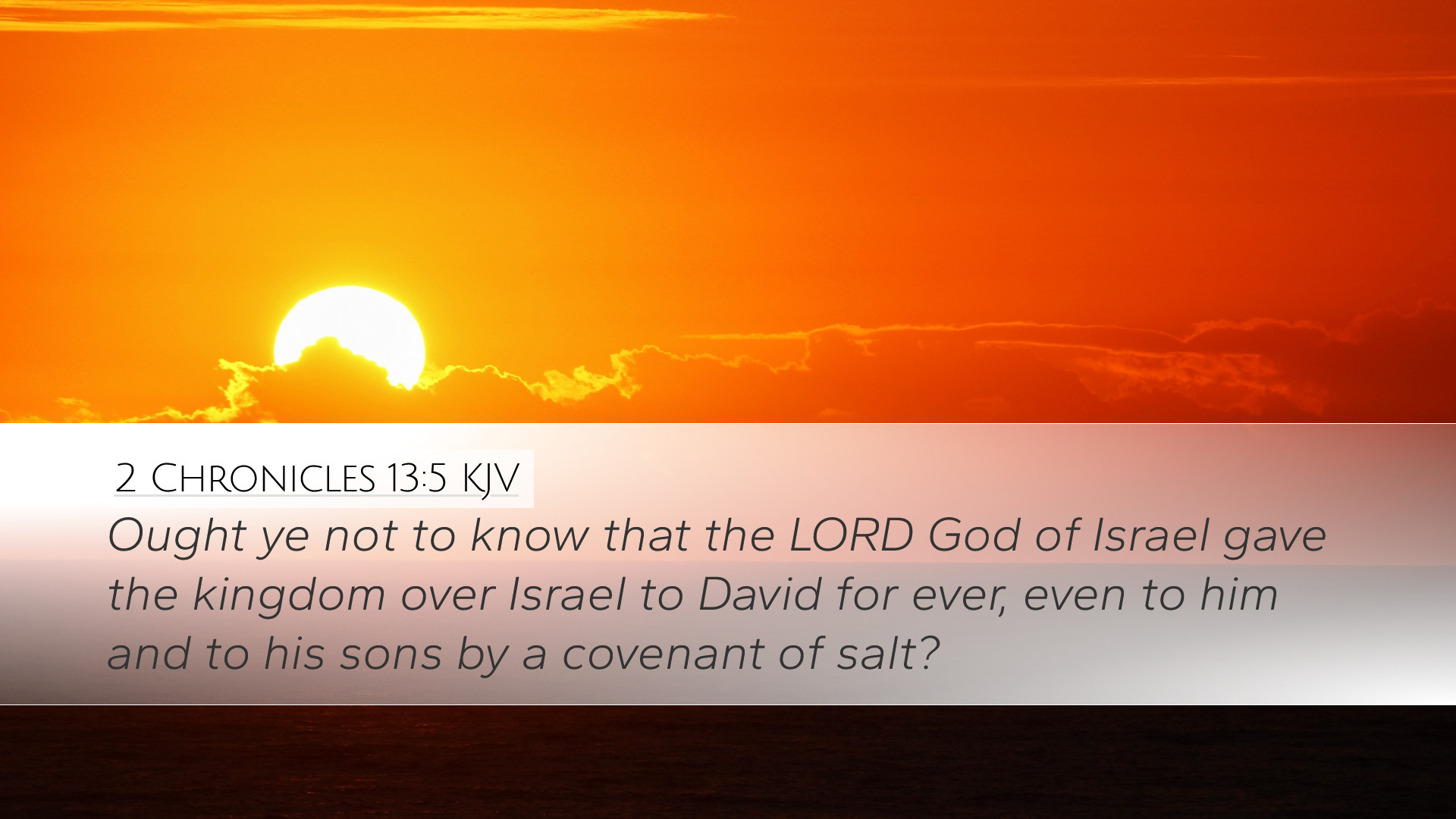Commentary on 2 Chronicles 13:5
Verse Reference: 2 Chronicles 13:5 - "Ought ye not to know that the LORD God of Israel gave the kingdom over Israel to David for ever, even to him and to his sons by a covenant of salt?"
Introduction
This verse falls within a significant moment in the history of Israel during the reign of King Abijah of Judah. This poignant declaration emphasizes the divine endorsement of David's lineage and the covenant established by God. The insights drawn from esteemed public domain commentaries illuminate its theological implications and historical context.
The Significance of the Covenant
Matthew Henry outlines the importance of the “covenant of salt,” which symbolizes perpetuity and fidelity. In ancient cultures, salt represented durability—commonly used in sacrifices and offerings as a token of God's enduring promises. This covenant was divinely orchestrated, bestowing a unique status upon David and his descendants, signifying that Judah's claim to the sovereignty is rooted in divine will.
The Historical Context
Albert Barnes provides a historical backdrop to the tensions between the kingdom of Judah and the northern kingdom of Israel. Following Solomon's reign, a division occurred which reflects the continuing struggle over rightful leadership. Abijah asserts that the northern tribes, under Jeroboam, have rebelled against God's ordained order.
- David's Legacy: The commentary notes that David’s reign was characterized not only by military triumphs but also by a deep and personal relationship with God, setting a precedent for his descendants.
- Covenantal Theology: The mention of the covenant serves as a theological anchor, affirming that God’s promises endure despite human disobedience.
- Rejection of Divine Authority: Abijah’s interrogation implies that the splintering of the kingdom represents a rejection of the divine authority established by God through his decree to David.
Key Interpretations
Adam Clarke offers an exegetical exploration of the text, suggesting that the phrase “gave the kingdom” indicates an irrevocable transition of power from the Lord to David’s lineage. This notion serves as a powerful assertion of God’s sovereignty over earthly kings and their reigns.
Implications for Leadership
Clarke elaborates on how this verse speaks to the nature of divine appointment and the responsibility that accompanies leadership. Here, Abijah indicates that true authority comes not from political maneuvering but from a faithful alignment with God's purposes.
- Spiritual Accountability: Leaders must recognize their roles as appointed by God and the consequences of their actions in light of this covenant.
- Legacy and Responsibility: The continuity of God's promises through David’s line prompts leaders to consider their spiritual heritage and its implications for guiding future generations.
Theological Reflections
The verse serves as a reminder of God’s unchanging nature and the serious commitment required from His followers. The covenant of salt portrays God’s unwavering faithfulness and underscores the weight of covenant relationships.
- Enduring Promises: The assurance that God’s promises are enduring amidst the unpredictability of human leadership invites theological reflection on grace and divine fidelity.
- The Role of Remembrance: By recalling the covenant, leaders and followers alike are encouraged to reexamine their understanding of God’s work throughout history.
- Faith in Crisis: In times of division and conflict, such reminders provide hope, reinforcing the belief that God's purpose will ultimately prevail.
Conclusion
2 Chronicles 13:5 encapsulates profound truths concerning God’s covenant faithfulness through the lineage of David. The combined insights from Matthew Henry, Albert Barnes, and Adam Clarke succinctly convey the depth of this message, offering lessons in leadership, accountability, and the enduring nature of God's promises. As this verse continues to resonate through generations, it calls upon all who lead and serve to uphold the divine values entrusted to them.


